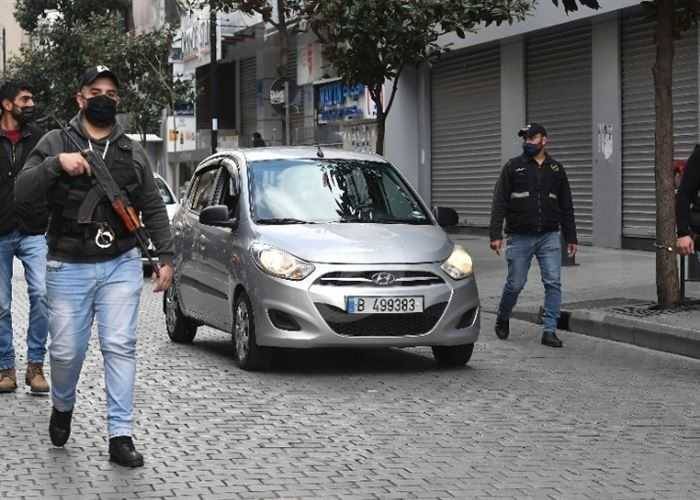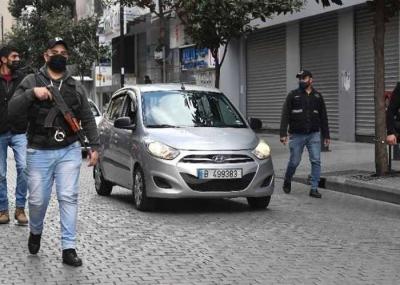Amid the financial collapse that Lebanon has been experiencing for years, which directly impacts state institutions and agencies witnessing unprecedented disintegration, the phenomenon of self-security has recently been on the rise among political parties, sects, and towns, with official security forces turning a blind eye, despite their duty to maintain security and uphold laws.
For over a year, a group calling itself "God's Soldiers" has expanded in the Ashrafieh area of Beirut, predominantly Christian. They justified their presence and expansion by claiming to protect Christian areas from murder and theft gangs, as the activity of security forces has diminished. This group holds extreme Christian views. On Wednesday evening, several of its members, dressed in black uniforms and displaying religious slogans, attacked a nightclub in the Mar Mikhael area near downtown Beirut, claiming it was promoting homosexuality. Videos circulated on social media showed this group attacking the nightclub, pursuing individuals inside, and assaulting them.
Earlier in May, a religious figure, accompanied by several people, expelled a woman and her husband from a beach in Sidon, southern Lebanon, due to her wearing a swimsuit (bikini), leading to several confrontations in the area between groups attempting to impose a ban on this attire and others protesting against such actions, before the municipality intervened to support the former approach.
The incident that occurred in the Kahale region in Mount Lebanon on the ninth of this month highlighted the decline of the role and authority of official security forces in favor of the burgeoning concept of "self-security" in towns and villages. A truck from "Hezbollah" carrying ammunition and weapons overturned in that area, leading to a conflict between the security personnel of the truck and local residents, resulting in two fatalities.
One of the clearest manifestations of self-security in recent years is the presence and expansion of "Hezbollah." The pursuit of a Syrian citizen accused of being a member of "ISIS" and responsible for an explosion near the Sayyida Zeinab shrine south of Damascus last July reignited discussions regarding "self-security" protocols in areas where Hezbollah operates, independent of official security apparatuses, especially since Lebanese security forces arrived at the site after the incident without being involved in the operation.
Riyad Qahwaji, head of the "Middle East and Gulf Military Analysis - Enigma" center, believes that "the phenomenon of self-security in Lebanon is not new and will escalate as judicial functions and security levels decline in the country, amid the absence of accountability and the proliferation of arms." He points out that "a state is usually based on security and law, and when citizens feel insecure and see that no one is enforcing the law, some will resort to establishing their own regulations and forming groups to protect their living environment and affiliations."
Qahwaji mentions in a statement to "Asharq Al-Awsat" that "when a group assumes the role of security forces by pursuing and raiding, and when Hezbollah continues to utilize its weapons for intimidation, there will undoubtedly be a counter-reaction and similar illegal occurrences." He adds: "Lebanon has transformed into a failed state, and a division is ongoing, albeit unannounced. Perhaps the most apparent show of federalism is present in Hezbollah areas, where no legitimate security apparatus is allowed entry before coordinating with them."
Meanwhile, mental health consultant Sabine Sader attributes the growth of the "self-security" phenomenon to "the absence of the state, its inability to provide necessary protection to citizens, and allowing certain groups to arm themselves while preventing others from doing so." She notes that "in light of assassinations, thefts, and crimes, many of which go unpunished, and given the public's belief that criminals affiliated with certain parties are protected, self-security becomes a reasonable response born of fear rather than strength."
Sader adds to "Asharq Al-Awsat": "With every phenomenon, there are groups that exploit it negatively by forming armed groups and militias that act in their own interest, exploiting citizen fears by convincing them that their actions are for their benefit and aimed at protection."
Sader considers that "the poor economic situation significantly influences the issue of self-security, especially if internal security personnel cannot mobilize quickly due to a lack of fuel for their vehicles, and if some police stations are closed for lack of electricity." She warned that this phenomenon would escalate if the political and economic situations remain unchanged.




